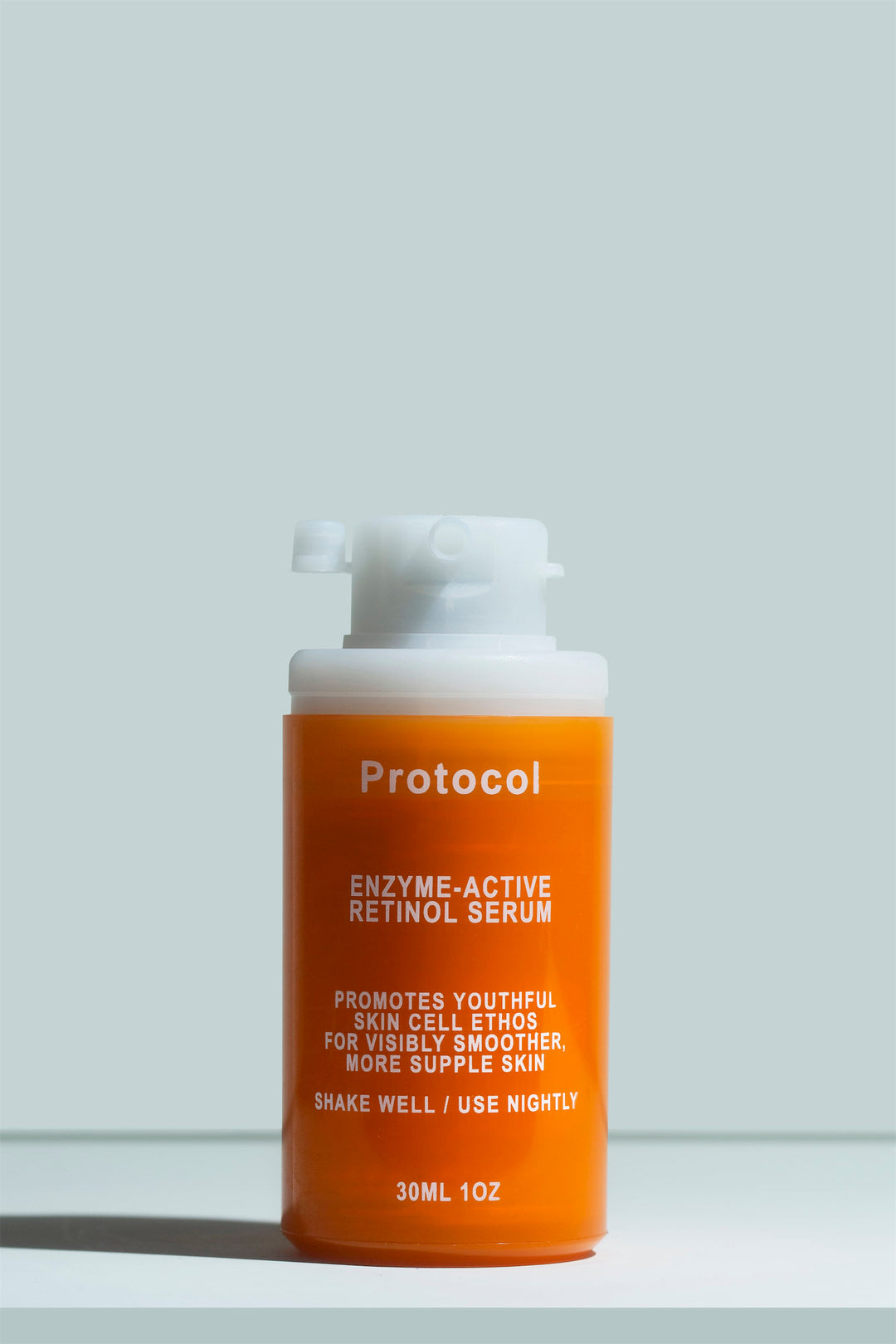Vitamin C and Ferulic Acid: Why Serum Shouldn't Smell Like Hot Dogs

Vitamin C and ferulic acid form one of the skincare world’s most famous combinations. We’re told that it is an essential pairing - that ferulic acid is integral to vitamin C’s stability. We’re also told that this combination is what’s behind the notorious “hot dog” smell that many vitamin C serums have.
If you’re a regular Protocol blog reader, you know there’s nothing we enjoy more than busting skincare myths. Today, we bust the myth that led to the rise of this unnecessary pairing and its resulting sausagey smell.
What does ascorbic acid do for the skin?
When we talk about vitamin C serums, we’re talking about serums made with ascorbic acid. That’s because ascorbic acid is the only truly active and bioavailable form of vitamin C.
Other ingredients often advertised as vitamin C, like magnesium ascorbyl phosphate, are pale imitations of the real deal that don’t even possess a fraction of its efficacy and potency as an antioxidant and skin-rejuvenating ingredient.
The trouble with this real, pure form of vitamin C is that it’s highly unstable, which makes finding a vitamin C serum that works a difficult process. Any exposure to light or oxygen causes vitamin C to degrade, so it can lose its efficacy within days, even just sitting on store shelves.
To develop our own Vitamin C Superserum, we had to resort to NASA technology to create bottles that could keep this ingredient stabilized.
Many other brands, however, opt for a shortcut that, as it turns out, doesn’t really work. That’s exactly what we’re talking about in this post today.
What is ferulic acid and why is it in vitamin C serums?
In skincare, ferulic acid is an antioxidant. This means that it’s able to neutralize some of the damage that’s caused to the skin by external aggressors like the sun, cigarette smoke, and pollution. There are a ton of antioxidants often used in skincare, including vitamin C, niacinamide, vitamin E, resveratrol, and green tea extract.
Ferulic acid is often combined with vitamin C because of a patent owned by SkinCeuticals (which is now owned by L’Oreal). The company found that combining ferulic acid with 15% vitamin C and 1% vitamin E led to a formula that had better longevity while in storage for up to 1 year.
This was determined by looking at the color of the serum after storage, and judging how much discoloration occurred. Ironically, the brand claims that its formula darkening is not a signal that it's losing efficacy - a claim that we find impossible to believe. We discuss this in more detail in our SkinCeuticals C E Ferulic review.
They also discovered that ferulic acid helped improve the photoprotective abilities of vitamin C, but not to the extent that a vitamin C serum could actually replace sunscreen.
Ferulic acid, oxidation, and the hot dog water smell
The thing is, while ferulic acid is able to prevent the oxidation of vitamin C, it’s not all that stable otherwise. Unless it is specially encapsulated, ferulic acid degrades very quickly, and once oxidized, it smells off.
You know what water smells like after you’ve used it to boil hot dogs? Yeah, it’s just like that.
Unfortunately, consumers are often misled and told that the smell is natural and attributed to fresh ingredients that are still active. Sometimes, they’re told that the smell is a combination of multiple ingredients.
Not only is this not true at all, but it’s also very problematic! Scent is one of the best ways for us to determine whether skincare has gone rancid. When vitamin C oxidizes, it puts out a sharp, metallic smell. With vitamin C and ferulic acid serums, the ferulic acid makes it so you can't tell how oxidized your vitamin C is!
As a result, we suspect that thousands of people out there are using oxidized vitamin C serums that aren’t doing their skin any favors.
You don’t need ferulic acid in your vitamin C serum
The myth that a vitamin C serum has to stink to be effective has been seeded thoroughly throughout the beauty world, and brands certainly aren’t going out of their way to correct it.
If you still want to enjoy the glow-boosting and protective effects of vitamin C, it’s important that you learn to recognize the signs of oxidation for yourself. Namely, look out for serums turning dark and opaque (or ones made with colorful ingredients that act as camouflage). And if anything smells bad you’re under no obligation to put it on your face!
In reality, vitamin C serums can remain perfectly stable without ferulic acid. Instead of trying to force vitamin C to tolerate UV and oxygen exposure, we can create a much better product by simply protecting it.
And there you have it! That’s the secret to the incredible potency and elegance of the Protocol Vitamin C Superserum.
Instead of smelling like feet or hot dogs, our stable formula is vaguely sweet and largely clear-colored, all because it's protected in a space-age little fortress that truly keeps the bad stuff out. We developed a bottling process using patented aerospace containment technology. It keeps the ascorbic acid in a truly light and oxygen-free environment, ensuring it stays fresh and potent up until the moment it reaches each client’s skin.
Give it a try if you’d like to experience pure, potent vitamin C for yourself, without the stinky, oxidized ferulic acid.




